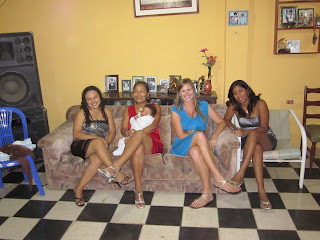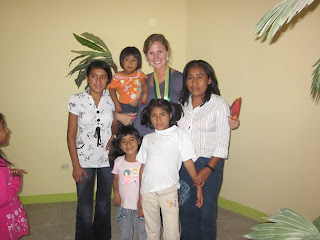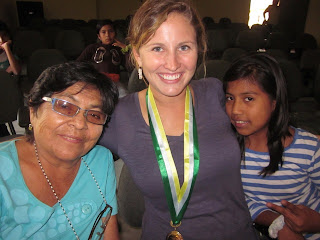After 27 months in Peru, and two years in a small coastal town in the northern desert called Vice, what do I take away? Many stories can be told by the things volunteers carry away from their Peace Corps service. In the end, what you take back is all you have. I am bringing back a plastic statue of the Virgen Mary that also doubles as a lamp. I have a small frame of Saint Judas, a notebook made of hand-woven cloth, a silver bracelet, a cloth cut-out with a design on it that appears to be a maze, an amethyst ring. I treasure a gold plated medal from the mayor of Vice, thanking me for my service. I am also bringing back jeans with holes in them, and new shirts and gym shoes that have replaced the old and worn ones. I am carrying folders overflowing with information and an external hard-drive full of photos and Latin music. I am bringing back new abilities: Spanish skills, a tolerance for other cultures, adaptation, and patience. All of these things mean so much to me. They are physical representations of the world I lived and worked in for two years, a culture that I learned to love, and a life that is very difficult to leave. However, what will stay with me forever, what I will still carry with me when the light bulb of my Mary lamp no longer works, and the hand-woven notebook frays from overuse, are the memories. The moments and faces that are engraved in my heart and mind forever.
The Moments:
• Eating mangos and avocados straight from the tree from the family’s land on a hot summer day
• Impromptu reggaeton dance party with 30 adolescent Peruvian girls at camp ALMA
• My mom falling out of her chair during Mother’s Day lunch on my parent’s visit to Vice
• A goal for Muni
• The smiles and laughter from the ancient men on their donkey carts carrying rice from the field as I pass them on my morning run
• Little kids playing in the dirt and saying my name as I pass
• The smell of homemade bagels made by some desperate volunteers missing home
• When I broke the plug of my fan right before going to sleep on a sweltering summer night
• Chicken foot soup on Christmas Day
• Volleyball students kissing me on the cheek to say goodbye after every practice (even if I make them run)
• An avocado facial complete with cucumber eye covers from my host cousins
• Rushing my host brother to the hospital in the middle of the night after a seizure
• Receiving a whole baked duck for my birthday
• My host mom’s toast at my going-away party
• Arriving at Iquitos after the canoe ride that went on 17 hours too long
• Running through the streets of Vice with the staff of the Municipality, chanting to encourage the rest of the population to join us
• Machu Picchu rising out of the clouds in the valley in the distance
• Ceviche and cold beer at Yasila beach with friends
• Saludos from the band for my birthday during the Corazon Serrano baile
• Dancing in circles during the “Hora Loca”
• Seeing friends from home race 8 year olds in Chalaco, and losing
• Realizing I could finally roll me R’s
• Saying goodbye and leaving town on my last moto-taxi ride from Vice
The Faces:
• Doña Yoya: My host grandma whose husband died years ago. She runs a corner store in town and takes care of her grandkids when she can. She is feisty as can be and despite her osteoporosis goes to every soccer game of the Club Deportivo Municipal and screams her heart out. I will never forget the conversations I have had with her when she was crying and telling me about how she couldn’t afford her medicines (which cost about $30 a month) and wasn’t able to sleep at night. She told me about how she didn’t have enough money to get her hair cut and she felt embarrassed to ask her kids to support her.
• Juan Carlos: One of the four boys who comes to my volleyball school for every single practice. He finished high school and his dream is to study to be a chef, but his dad won’t let him because it’s a woman’s career. Instead they are sending him to an institute to study architecture. He loves volleyball and has an intense competitive spirit. He’s a leader and likes to inspire and teach his teammates. His dad doesn’t let him play volleyball and has beat him until he’s bled from the nose and mouth for coming to our practices. His brothers have burned his volleyball net and balls all because volleyball is a girls sport. His dad prefers that he go drinking (at age 17) than play volleyball. Imagine if you weren’t allowed to practice the sport you loved because your parents were so closed-minded.
• Señora Elena: The president of the artisan association in Chalaco and treasurer of the district association in Vice. She is the mother of four incredible little girls between the ages of 14 and 2. Her husband has Parkinson’s disease and is out of work. She supports the family selling chifles (banana chips) that she makes because she never finished high school. She makes between 6 and 8 soles a day (about 3 dollars) to support her daughters, one of who is partially paralyzed and receiving therapy. She is energetic and supportive and always works for the better of the group. She is participative and always wants to learn new things. They are the most generous people I have met in Peru, always giving me food and hugs when they don’t have anything else.
• Lucero: My little 11 year old cousin who acts like she’s 27. She’s so intelligent and curious and wants to be a doctor someday. She’s is 2nd place in her class and loves to study but doesn’t like to read. She gravitates to visitors and doesn’t feel shy or embarrassed to ask questions and learn more. The day I left her mom told me that I was like a sister to her even though she didn’t have any sisters. I hope she can come to the States someday to study medicine and learn English.
What do I leave behind? I taught some things, organized some groups, and left some pictures. I hope Vice remembers me as an independent person who wasn’t afraid to work hard for the development of the town, a good friend and a good example for other girls who someday want to do more than just cook and clean the kitchen. These past two weeks have been full of goodbyes and going away parties from artisans in Chalaco and Letira, the community bank in Sechura, my family, and the Municipality. Everyone had wonderful things to say and I left many tears behind, many people who have helped me and supported me through hard times. People who have frustrated me, but have also made me laugh. We have danced, sang, eaten, cried, played, worked and lived together, and now it’s coming to an end.
Thank you Peace Corps, Peru, and especially Vice for such an amazing experience. I don’t know if anything I do will ever make such an impact on me again. I saw a new culture and embraced it. I doubt there will ever be another time in my life where I will find myself living in a small community in a foreign country for such an extended period of time to actually become a part of it. Even when I go back to Vice, it won’t be the same. I really can’t express the feeling of having to leave and the sadness that I also carry with me.
Thank you to all my friends and family who have supported me during these past 27 months. I know that in the beginning it never seemed like it would end. I am looking forward to being there for the important events, for reunions, holidays, birthdays, and WEDDINGS. At least until my next adventure.
I carry many lessons away from Peace Corps, but perhaps the most important is this: there is more than one way to live a life. Before coming to here, I had very limited experience with diversity and different types of people. I thought my life had to follow a structured sequence and that there was one fixed way to achieve my goals. I didn’t consider, in my life plan, time to discover and explore and make mistakes. I have been rushed, and I have missed the point. I have learned from other volunteers and Peruvians themselves that there are many paths to happiness and now I have to work on finding one that works best for me.
See you on September 16th in the States, maybe you can help me carry my luggage home?
Chau amigos!
Wednesday, August 17, 2011
Subscribe to:
Comments (Atom)






























